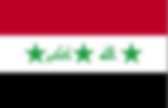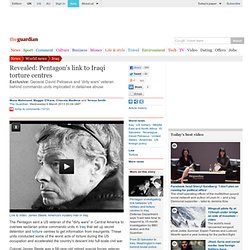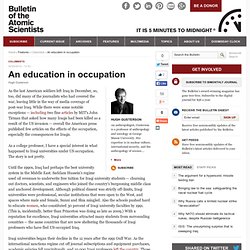

Revealed: Pentagon's link to Iraqi torture centres. Link to video: James Steele: America's mystery man in Iraq.

Iraq War Timeline. America's mini-city on the Tigris - Features. The embassy is the largest US mission in the world and will cost nearly $4bn to operate [EPA] Baghdad, Iraq - It is a multi-million dollar programme which Iraqi officials have said they do not need, a US watchdog has called a "bottomless pit", and the US embassy here considers a key part of its relationship with post-occupation Iraq.

The State Department will spend nearly $1bn in 2012 on a police training programme, the largest operation at the sprawling US embassy here. Dozens of former US police officers have been hired to teach their Iraqi counterparts about arrests and investigations, DNA evidence, and basic managerial tasks. Their resumes are impressive, most with decades of experience in domestic and international law enforcement. Iraq: the politics of the local. Now that the first phase of the Iraqi civil war seems to have ended, it is time to consider the political processes it may have left in its bloody wake.

It is crucial for Iraqis and others to get a sense of the stability and durability of present arrangements. Are they a mechanism for reconciling the ferocious enmities of the past five years in Iraq, or likely to lead to a more violent second phase of the civil war. Charles Tripp is professor of middle east politics at the School of Oriental and African Studies (Soas), University of London.
Among his books are A History of Iraq (Cambridge University Press, new edition, 2007), and Islam and the Moral Economy: The Challenge of Capitalism (Cambridge University Press, 2006) This article was first published in Le Monde Diplomatique (January 2008) There have been two main patterns during these years of violence and massive population displacement.
Vs. Iraq. How Did Iraq Get Its Weapons? We Sold Them. THE US and Britain sold Saddam Hussein the technology and materials Iraq needed to develop nuclear, chemical and biological weapons of mass destruction.

Reports by the US Senate's committee on banking, housing and urban affairs -- which oversees American exports policy -- reveal that the US, under the successive administrations of Ronald Reagan and George Bush Sr, sold materials including anthrax, VX nerve gas, West Nile fever germs and botulism to Iraq right up until March 1992, as well as germs similar to tuberculosis and pneumonia. Other bacteria sold included brucella melitensis, which damages major organs, and clostridium perfringens, which causes gas gangrene.
Classified US Defense Department documents also seen by the Sunday Herald show that Britain sold Iraq the drug pralidoxine, an antidote to nerve gas, in March 1992, after the end of the Gulf war. Pralidoxine can be reverse engineered to create nerve gas. ©2002 smg sunday newspapers ltd. Rashid Khalidi on Iraq and America in the Middle East. An Iraqi Film Hero in America - Naomi Wolf. Exit from comment view mode.

Click to hide this space NEW YORK – One of Iraq’s only working filmmakers, Oday Rasheed – whose brilliant film 2005 Underexposure followed a group of characters in Baghdad after the United States-led invasion in 2003, and whose new film Qarantina is now premiering – is in Manhattan. Engelhardt, Lessons from Lost Wars in 2012. [Note for TomDispatch Readers: We’re back, ready to do our best to keep up with what’s certain to be a tumultuous 2012, starting with an assessment of America’s lost wars in the Greater Middle East.

By the way, I made an appearance on Marwan Bishara’s show “Empire” on Al-Jazeera as last year ended. If you’re interested, you can check it out by clicking here. Finally, let me thank all of you who sent in a contribution to TomDispatch in 2011. Your generosity was startling and deeply appreciated. Of course, it’s now a new year, which means the contribution cycle begins all over again for us. Debacle! It was to be the war that would establish empire as an American fact. An education in occupation. As the last American soldiers left Iraq in December, so, too, did many of the journalists who had covered the war, leaving little in the way of media coverage of post-war Iraq.

While there were some notable exceptions -- including two fine articles by MIT's John Tirman that asked how many Iraqis had been killed as a result of the US invasion -- overall the American press published few articles on the effects of the occupation, especially the consequences for Iraqis. As a college professor, I have a special interest in what happened to Iraqi universities under US occupation. The story is not pretty. Reflections on Iraq and Arab-US relations. Geneva, Switzerland - As American troops are finally pulling out of Iraq and heading back home, those who genuinely wish both the United States and the Arab world well must be heaving a deep sigh of relief.

A sober assessment of that war should show how misguided and utterly avoidable the invasion of Iraq in 2003 was. As the Arab Spring has amply demonstrated, there are much less costly ways for getting rid of tyrants. Any dispassionate assessment of that unfortunate eight-year-long war should reach conclusions along the following lines: What Iraq can teach us about Iran.
Former Iraqi minister of trade and defense Ali A.

Allawi has an interesting op-ed in today's New York Times, where he outlines the main challenges in post-occupation Iraq and maps out a broad approach for dealing with them. Not surprisingly, he is better at identifying the problems Iraq confronts than in providing ready solutions, for the simple reason that there aren't any easy answers to Iraq's current plight. Saddam Hussein's brutalities notwithstanding, that is one reason why some of us thought invading Iraq was a foolish idea back in 2002-2003. Iraq's military power had been largely defanged by defeat in the 1990-91 Gulf War and by ten years of punishing sanctions, so it was no longer a serious threat to vital U.S. interests. Equally important, no one ever gave a plausible account of how a post-Saddam social and political order would be established, especially in light of what was known about Iraq's fractious and violent history and deep internal divisions.
In short, Mr. Rosen: U.S. occupation in Middle East is 'imperialist.' US invasion leaves lasting Iraq scars. Inside the World's Largest Embassy. Editor's note: In 2009, Peter Van Buren, a two-decade veteran of the Foreign Service, volunteered to go to Iraq.

Obama/ Maliki Conflicts on the Future of Iraq. Al-Sharq al-Awsat carried an article on December 15 about the behind the scenes conflicts between US President Barack Obama and Iraqi Prime Minister Nouri al-Maliki. My guess is that a Maliki staffer leaked these conflicts. The piece was translated by the USG Open Source Center and I’m using their rendering when quoting in English below. 1. Obama wonders if al-Maliki can and will provide security to the 16,000 American diplomatic & aid personnel who will remain.